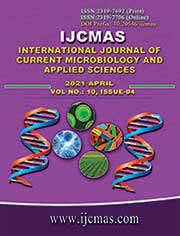


 National Academy of Agricultural Sciences (NAAS)
National Academy of Agricultural Sciences (NAAS)

|
PRINT ISSN : 2319-7692
Online ISSN : 2319-7706 Issues : 12 per year Publisher : Excellent Publishers Email : editorijcmas@gmail.com / submit@ijcmas.com Editor-in-chief: Dr.M.Prakash Index Copernicus ICV 2018: 95.39 NAAS RATING 2020: 5.38 |
Occurrence of high density of pest infestation at different growth stages of cabbage results into severe yield reduction. Innumerable inorganic and organic pesticides are used to control pests; however it negatively affects soil enzymes. Five pest management schedules viz. FYM + RDF + pest management as per package of practice (PMPP), FYM + RDF + integrated pest management (IPM), FYM + RDF + organic pesticides, organic nutrients + organic pesticides (control) and FYM + RDF + pest management followed by farmers (PMF) were evaluated to assess the impacts of these pesticide residues on dehydrogenase, urease and phosphatase enzymes activity in soil under cabbage cropping. Results showed that inhibition of enzyme activity was mostly observed at high amounts of pesticides, but promotion or stimulation of enzyme activity was observed at low amounts. Highest inhibition of dehydrogenase activity (30.63%) was observed in soil with higher concentration of pesticides with the treatment of FYM + RDF + PMF. Increased dehydrogenase enzyme activity (2.30%) was noticed in soil treated with FYM + RDF + organic pesticides as compared to control. Dehydrogenase activity showed highest sensitivity to pesticides followed by urease and phosphatase whereas maximum stimulation was recorded with phosphatase. Treatment of FYM + RDF + IPM was found the best for augmenting soil enzymes activities, and thus advisable to the farmers for sustainable production of cabbage grown in tropical red soil.
 |
 |
 |
 |
 |